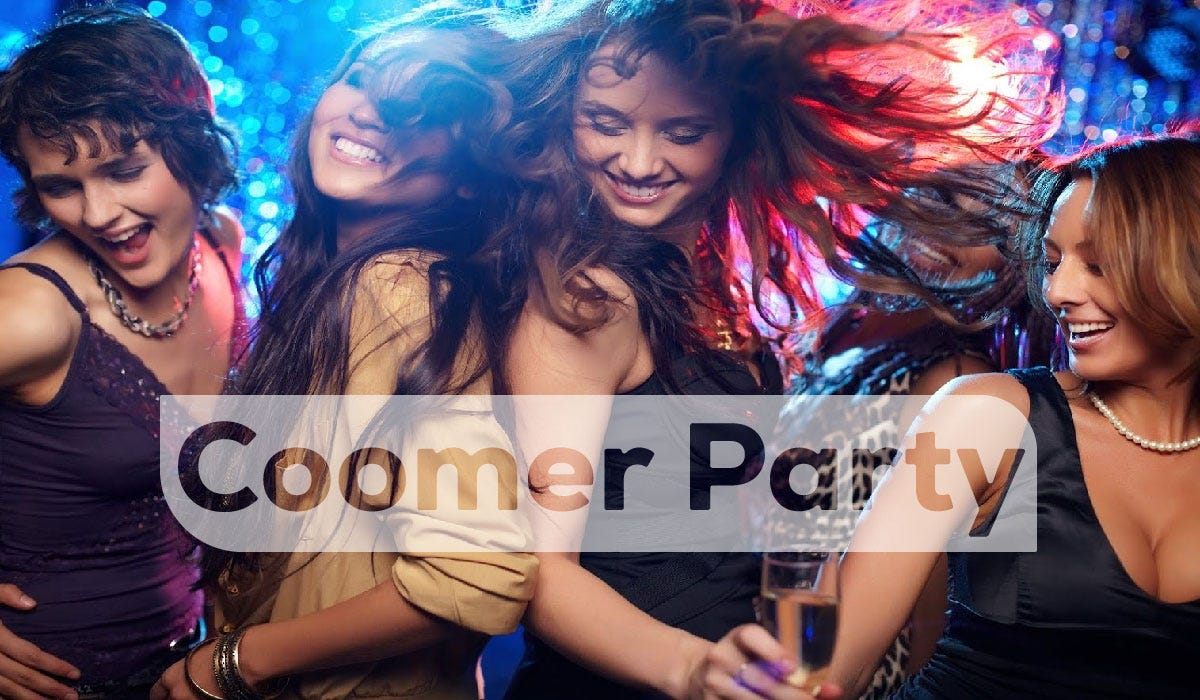In recent years, the internet has given birth to countless subcultures, each with its unique lexicon and identity. Among these is the “Coomerparty,” a term that has increasingly found its way into online discourse. The Coomerparty phenomenon reflects a mixture of humor, social commentary, and the internet’s ability to amplify specific narratives, often to extreme lengths. Whether you’ve stumbled upon it through memes, online discussions, or social media threads, understanding the origins, nature, and implications of Coomerparty requires unpacking several layers of digital culture and online behavioral trends.
What is Coomerparty?
Coomerparty is a term often associated with a niche online subculture rooted in the internet’s meme culture. The word “Coomer” itself is derived from a caricature often used in memes to represent a certain type of internet user, typically male, who is overly obsessed with instant gratification, particularly of a sexual nature. Combined with “party,” the term conjures up a gathering of like-minded individuals who engage with this identity—often humorously or satirically.
However, the “Coomer” meme has also become a broader social commentary on online addiction, the consumption of adult content, and the consequences of living in an era where instant access to any form of entertainment or gratification is only a click away. Coomerparty, therefore, represents not just a meme but an exploration of digital addiction and the identity crises that often accompany it.
Origins of the Coomer Meme
The term “Coomer” initially gained popularity around 2018-2019 on forums like 4chan and Reddit, platforms well-known for their meme creation and internet-centric discourse. The original “Coomer” was depicted as a cartoonish, balding man with exaggerated features, representing a stereotype of someone whose life revolves around immediate self-pleasure, often to the detriment of their well-being. This image quickly became a meme, shared across various platforms, as both a humorous jab and a serious critique of modern-day behaviors shaped by the internet.
It’s crucial to understand that while Coomer memes may appear light-hearted, they often touch on deeper themes like loneliness, addiction, and the impact of widespread access to explicit material on human relationships and self-image. The memes reflect the frustrations and ironies of modern life, where an endless supply of content, including adult media, can lead to harmful compulsions.
The Evolution into Coomerparty
While the Coomer meme itself remains prominent, the concept of “Coomerparty” evolved as internet users began to collectively embrace or criticize the identity associated with “Coomers.” It isn’t just a term anymore but a subculture where people either ironically or seriously discuss the traits of “Coomers,” often in online groups or social media threads.
This evolution from a single meme to an entire “party” or community highlights the internet’s tendency to amplify even the most niche ideas. What was once a humorous commentary on internet addiction became a rallying point for discussions on the broader impacts of digital behavior on mental health, relationships, and self-control.
Coomerparty as Social Commentary
At its core, Coomerparty functions as both a social commentary and a coping mechanism for dealing with the digital age’s overwhelming nature. In an era where distractions are abundant, particularly adult content, discussions surrounding the Coomerparty often reveal deeper concerns about society’s trajectory. It’s not just about making fun of “Coomers,” but also about recognizing the growing issue of digital addiction.
Through memes and online interactions, members of the Coomerparty often express feelings of frustration with the current state of affairs, be it the accessibility of explicit content, the effects of pornography on relationships, or the general sense of aimlessness that can come from constant online indulgence. The Coomerparty subculture thus acts as both a critique and an acknowledgment of the struggles many face in maintaining a healthy digital life.
Psychological and Behavioral Insights
From a psychological standpoint, the Coomerparty phenomenon reflects broader trends in internet addiction and its associated behaviors. Studies have consistently shown that excessive consumption of explicit content can lead to a range of issues, including decreased emotional intimacy in relationships, distorted perceptions of sexuality, and compulsive behaviors. Coomerparty brings these discussions to the forefront, albeit in a meme-driven, often satirical format.
Furthermore, the rise of the Coomerparty can be tied to the growing conversation around dopamine-driven internet usage. Platforms designed for instant gratification, whether through social media, gaming, or adult entertainment, tap into the brain’s reward centers, encouraging repeated use. The Coomerparty subculture reflects this struggle, as many participants are self-aware of the issue but often feel helpless to escape it.
The Role of Social Media in Amplifying Coomerparty
Social media platforms like Reddit, Twitter, and Instagram have played a significant role in amplifying the Coomerparty subculture. Memes travel fast across these networks, spreading ideas and fostering communities where like-minded individuals can gather and discuss. In the case of Coomerparty, these platforms allow for the rapid exchange of jokes, stories, and critiques, creating an ecosystem where the term evolves beyond its origins.
Moreover, social media has a dual function in the Coomerparty phenomenon. On the one hand, it facilitates the growth of the subculture by providing a space for people to engage with the idea. On the other hand, it also perpetuates the behaviors that the Coomerparty critiques. The endless scroll of content, the ease of accessing explicit material, and the dopamine rush from social validation all contribute to the very issues Coomerparty addresses.
Is Coomerparty Harmful?
The question of whether Coomerparty is harmful depends on how one interacts with it. For some, it’s a humorous way to engage with online culture and reflect on personal habits. For others, it may serve as a harmful reinforcement of compulsive behaviors and unhealthy attitudes towards sexuality and relationships.
The danger lies in the potential for normalization. While the meme’s satirical nature highlights the issue of digital addiction, there’s a risk that repeated exposure to the Coomer identity could trivialize serious concerns like pornography addiction, emotional detachment, and the erosion of real-life relationships. In this sense, Coomerparty can act as both a mirror and a mask—reflecting real problems but also obscuring their severity through humor.
Coomerparty and the Future of Internet Culture
Looking forward, Coomerparty is unlikely to disappear anytime soon. As long as the internet continues to shape human behavior, subcultures like Coomerparty will emerge to comment on, critique, and sometimes embrace the consequences of a hyper-connected world. It is part of a larger trend where memes and digital subcultures evolve to capture the essence of the digital age—where boundaries between humor, critique, and personal identity often blur.
As more people become aware of the impacts of their digital habits, the conversations happening within Coomerparty may shift from satire to serious discussions on mental health, digital detox, and the challenges of navigating online life in a balanced way. Whether people continue to engage with the term ironically or use it as a stepping stone for self-reflection, Coomerparty highlights the increasingly complex relationship between humanity and technology.
Navigating the Digital Landscape Post-Coomerparty
Understanding Coomerparty is also about understanding the digital landscape in which it thrives. In a world where instant gratification is increasingly normalized, digital literacy and self-awareness become essential tools for navigating the complexities of internet life. The Coomerparty subculture may serve as a reminder of the pitfalls of unchecked online behavior, but it can also inspire more conscious engagement with technology.
Balancing entertainment and personal well-being will be crucial for future generations, and perhaps the very memes that highlight problematic behaviors will also inspire change. Coomerparty, like many internet phenomena, is a product of its time—but its lessons about addiction, loneliness, and the effects of hyper-connectivity will likely resonate for years to come.
FAQs
What does Coomerparty mean?
Coomerparty refers to an online subculture and meme that critiques and satirizes internet addiction, particularly related to adult content consumption, while also representing a humorous take on modern digital behaviors.
Is Coomerparty harmful?
Coomerparty can be both harmful and helpful. It can trivialize serious issues like addiction through humor, but it can also raise awareness about the consequences of digital overconsumption.
How did Coomerparty start?
The term originates from the “Coomer” meme, which gained popularity on platforms like 4chan and Reddit in the late 2010s. Coomerparty evolved as a way to engage with the meme’s themes in a community-oriented way.
What is the Coomer meme?
The Coomer meme represents a caricature of a person overly obsessed with instant gratification, particularly in the context of adult content, often to the detriment of their personal life and well-being.
Why is Coomerparty popular?
Coomerparty’s popularity stems from its blend of humor, social commentary, and relatability. It touches on common struggles many face with digital addiction and hyper-connectivity in today’s world.
How can I avoid becoming part of the Coomerparty?
Maintaining digital literacy, setting healthy boundaries with internet use, and practicing mindfulness can help avoid the pitfalls of excessive consumption and the issues Coomerparty critiques.











